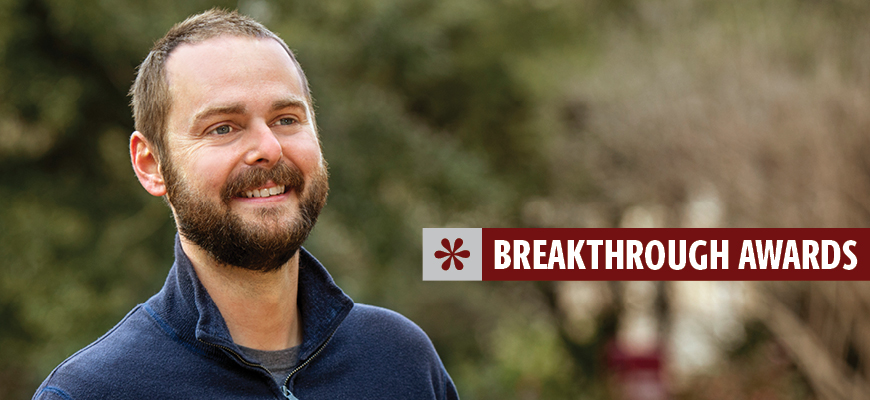
Breakthrough Star: Glenn Weaver
Public health researcher looks to stop students’ summer weight gain
Posted on: June 15, 2021; Updated on: June 15, 2021
By Craig Brandhorst, craigb1@mailbox.sc.edu, 803-777-3681
If you work in childhood education — or even just have school-age children — you’re probably familiar with the “summer slide,” that decline in academic achievement that happens when kids are out of school for an extended stretch.
Glenn Weaver, an assistant professor of exercise science and a member of the Arnold Childhood Obesity Initiative research team, is currently focused on a similar summertime phenomenon — but as it relates to childhood weight gain and obesity across different demographics.
“One thing that has really come to light during our research is that over the summer, children’s BMI increases at a faster rate than it increases during the school year,” says Weaver. “And children who are minority and from lower income backgrounds experience that to a greater degree than their counterparts.”
Those findings led to what’s now known as the structured day hypothesis, which posits that children perform better or engage in healthier behaviors when they have a structured environment that’s adult-led, supervised and provided for them.
“And the school day is kind of the ultimate structured day,” he says. “There are teachers watching you all day, you’re served healthy foods, you’re provided with physical activity opportunities, whether through PE, recess or even just getting up out of your chair to go to your next class.”
With that hypothesis in mind, the Arnold Childhood Obesity Initiative launched Healthy Summer Learners, a six-week, NIH-funded intervention study that provided children from low-income families access to a healthy, structured and activity-focused summer program.
From 8 a.m. to 3:30 p.m., four days a week, participating elementary school age children received three and a quarter hours of reading instruction plus physical activity opportunities. In addition, breakfast, snacks and lunch were served in accordance with USDA summer food service guidelines.
“That was kind of a pilot trial, but we had promising results, so I’m seeking further funding from the NIH to ramp that up and do a more definitive, larger-scale, randomized trial,” say Weaver.
School is a healthy environment. We’re trying to provide a bridge from one school year to the next so that we don’t see the negative health impacts occur.
Glenn Weaver
Another study, however, yielded some unexpected results and prompted different questions.
Working with two Midlands-area schools — one on a traditional calendar with a built-in three-month summer break, the other on a “balanced calendar” with shorter three-weeks breaks punctuating a 12-month school year — the team tracked fitness and BMI from matched sets of children over a three-year period. And they were surprised by their findings.
“During the traditional school year they were actually gaining BMI at a greater rate, and then over the summer they were losing BMI at a greater rate,” Weaver says. “We’ve been exploring why that might be the case.”
Breaks also seemed to have a greater adverse effect on the fitness and BMI of children in year-round schools than on the children from schools on a traditional calendar. One possible explanation, Weaver says, could be psychological — the knowledge that their breaks are shorter than those of other kids their age prompting behavioral changes.
Whatever the next round of studies determines, Weaver is quick to emphasize the big picture, which is principally focused on creating healthy, structured environments.
“The idea isn’t that this program is going to change these children’s behaviors for years and years after a six-week program,” he says. “The idea is that school is a healthy environment. We’re trying to provide a bridge from one school year to the next so that we don’t see the negative health impacts occur."
He’s also not advocating for year-round school as a way to address BMI and summer weight gain. “In one study we saw the opposite,” he says. “The takeaway from that study is that structure during unstructured time can positively impact health behaviors.”